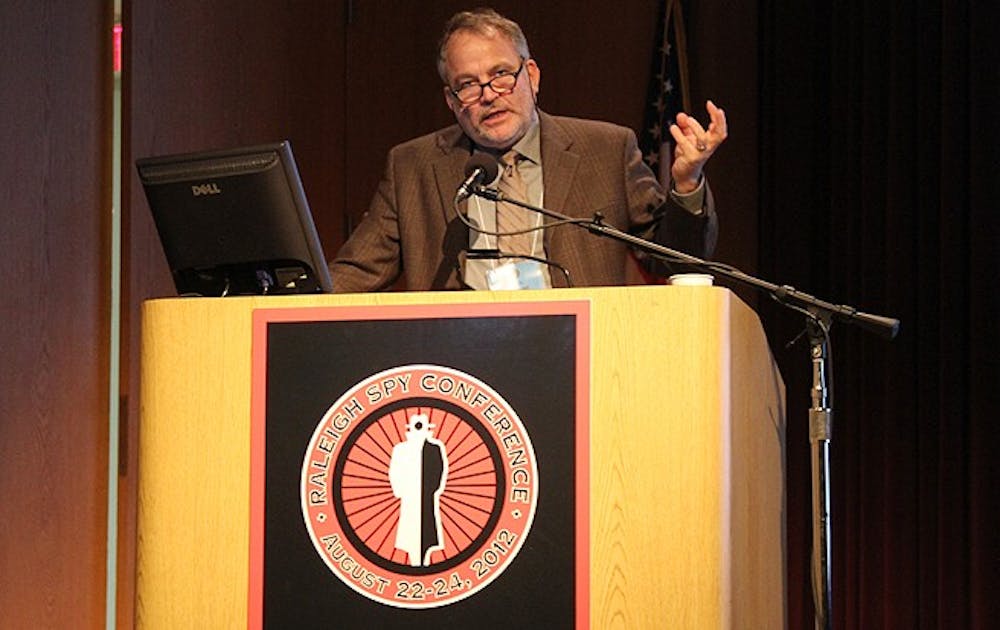Freshly declassified information on the twentieth century’s most influential spies and intelligence operations drew Baby Boomers and former spooks to the North Carolina Museum of History Thursday.
Historians, journalists and intelligence operatives presented newly uncovered findings from previously secret files at the eighth annual Raleigh Spy Conference. The conference was commenced by Bernie Reeves, the founder of the Raleigh Spy Conference, who lauded the importance of examining history through the use of primary government sources.
“We don’t really know what happened until somebody declassifies something,” said Reeves, who is also the editor and publisher of Raleigh Metro magazine.
Subsequent speakers delivered a fresh take on the career of long time FBI director J. Edgar Hoover and the birth of the modern spy culture. Author and journalist Max Holland argued for re-examining both the popular conception of the Watergate scandal and the perceived heroic whistle-blower Deep Throat, whose real identity was FBI Associate Director Mark Felt.
Holland countered the prevailing narrative of Deep Throat as a principled truth-teller who revealed links between the Watergate break-in and the White House. He cited evidence that Felt carefully manipulated the media to advance his quest for the directorship of the FBI.
“[Felt] was contemptuous of the media, contemptuous of its short attention span—always looking for the next front-page story,” Holland said. “And he was confident in his ability to manipulate it.”
A few months after Nixon claimed his second term in office, Hoover died, leaving the directorship vacant—and the competition to fill the position was cutthroat, Holland said. Felt leaked Watergate-related information and misinformation to the press to prove that the interim director, Nixon-appointee L. Patrick Gray, did not command the respect of his FBI agents and executives.
Felt leaked information to Washington Post reporters Bob Woodward and Carl Bernstein, but a third to a half of the leaked information was untrue, Holland said.
In addition to publishing this material, Holland noted some discrepancies between the original transcripts of the interviews with Deep Throat and the published account in Woodward and Bernstein’s All the President’s Men. The book, which Holland described as “not completely non-fiction” was soon after made into a popular film starring A-list actors Robert Redford and Dustin Hoffman.
“When you’re portrayed by Robert Redford, you have a lot more leeway,” Holland said.
He likened the Deep Throat saga to the classic Western film “The Man Who Shot Liberty Valance,” which was famous for its commentary on media consumers’ attraction to sensationalized stories, even if they are not completely true.
“When the legend becomes fact, print the legend,” the journalist says in the film.
FBI historian John Fox presented a nuanced portrait of J. Edgar Hoover as a hard-working bureaucrat who worked his way up to the role of FBI director and proceeded to guide his organization through decades of growth and maturation. He developed the best paper database in the world to keep track of the information his agents collected, and sparred with other intelligence leaders—like CIA founder Bill Donovan—over what role the FBI would take in the post-WWII American intelligence community.
The image of Hoover as a crime-fighting hero contrasts with actions seen as overstepping his bounds, such as his use of intelligence to attempt to damage Martin Luther King’s public image.
“It does suggest perhaps that intelligence leaders need to leave after a time,” Fox said. “Even the strongest of leaders can make mistakes and leave clear warning signs of things to avoid.”
Fox also responded to a question from the audience regarding the rumor that Hoover was a cross-dresser by noting that the historical evidence did not support that claim.
“It’s one of those images that strikes people’s imagination in all the wrong ways,” Fox said. “You see a picture of Hoover and you wouldn’t want to see him in a dress, would you?”
The Raleigh Spy Conference continues Friday with Brian Latell, the keynote speaker and retired CIA officer, discussing newly declassified insights into the sophistication of Fidel Castro’s spy intelligence services.
Get The Chronicle straight to your inbox
Signup for our weekly newsletter. Cancel at any time.

